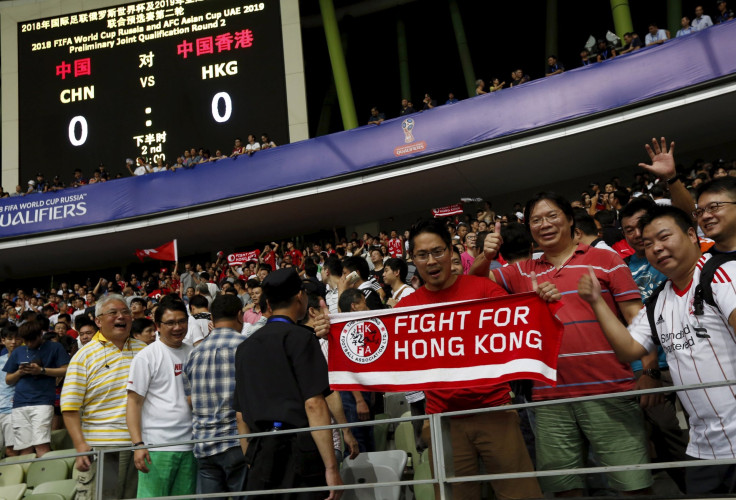China Stunned By Hong Kong In World Cup Soccer Qualifier, Amid Political Tensions And On-Pitch Controversy

SHANGHAI -- As China celebrated its war victory against Japan in Beijing on Thursday, the country’s soccer-loving President Xi Jinping may have been momentarily distracted by a less conclusive result.
China’s national soccer team, which the government has pledged to built into a major force, was held to a 0-0 draw at home, in a World Cup qualifying match against Hong Kong -- the city of seven million inhabitants that is part of China’s own territory but retains its own soccer team.
The shock result, against a team ranked 72 places lower than China in the official FIFA world rankings, was China’s worst performance against Hong Kong in three decades -- though it did not lead to consequences as extreme as the last shock result, when Hong Kong’s 2-1 victory in Beijing in 1985 led to riots in the streets.
Hong Kong’s coach Kim Pan-gon admitted his team had been lucky -- China hit the woodwork four times, and had 41 shots on goal, while Chinese media said the referee had denied the team a clear penalty. Nevertheless the result leaves China in third place in its group behind Hong Kong and Qatar, who beat Bhutan 15-0 (though China has a game in hand over Hong Kong). And Chinese media said the result raises concerns about whether a team that was favorite in its group, and is under great pressure to do well after years of disappointing its fans, will get through to the next round of qualifiers for the 2018 FIFA World Cup Finals.
The result may also fuel tensions between the two sides, which have risen since political protests in Hong Kong last year against China’s proposals for the election of Hong Kong’s next leader, which many citizens complained were undemocratic. At Hong Kong’s two previous World Cup qualifying matches, Hong Kong fans had booed the Chinese anthem -- which is also Hong Kong’s anthem -- leading to complaints from Chinese citizens and a warning from FIFA.
The authorities in Shenzhen, just across the border from Hong Kong, where Thursday’s match was played, warned Hong Kong fans in advance that anyone “disrespecting the national anthem or flags,” or wearing clothes or carrying banners deemed to “endanger national security” could face a fine and up to 10 days in detention, Hong Kong’s South China Morning Post reported.
There had also been controversy when the Chinese Football Association published a social media post, which described the Hong Kong team as made up of people “with black skin, yellow skin and white skin.” Some saw this as simply a reference to the cosmopolitan make-up of the Hong Kong team, but others saw it as a racist slur.
In the event the playing of the national anthem is reported to have passed off smoothly, but some Hong Kong fans complained about having to present their identity documents to get into the stadium, while others said they were not allowed to bring banners into the stadium. [Many Hong Kong fans have recently taken to carrying barriers with the slogan “Fight for Hong Kong”.]
And after the game there was further controversy when Hong Kong’s hero, goalkeeper Yapp Hung-fai, who made a number of saves to prevent China scoring, accused Chinese captain Zheng Zhi of insulting him after the match, by calling him a "dog." However Hong Kong Football Association chairman Brian Leung said Friday he had not heard about the incident from the players at the time -- and some analysts questioned whether there could have been a misunderstanding, as most of Hong Kong’s players speak Cantonese dialect rather than the mainland’s Mandarin.
Nevertheless, the result clearly upset many Chinese soccer fans, who have got used to seeing their team performing poorly, but had seen their hopes raised after China, under French coach Alain Perrin, won its group in the recent Asian Cup Finals, before losing to eventual champions Australia. A poll on Chinese social media site Sina.com showed that 90 percent of Chinese fans were dissatisfied with the result against Hong Kong.
China has only qualified for one World Cup, in 2002, when Asian soccer powers Japan and South Korea were hosts, and therefore qualified automatically, freeing up more spaces for other Asian teams. In the past year, however, Xi has set up a special group in China’s top leadership to develop the country’s soccer, which has issued a 50-point plan that seeks to turn the country into a “soccer powerhouse.” Soccer will become a compulsory subject in schools, with new textbooks for all students.
China's coach Perrin said the result against Hong Kong was not “the worst,” and said his team had deserved victory though he admitted that the game had been “like a children’s match,” according to Chinese media reports, and said China’s attackers had not been effective enough.
© Copyright IBTimes 2024. All rights reserved.






















